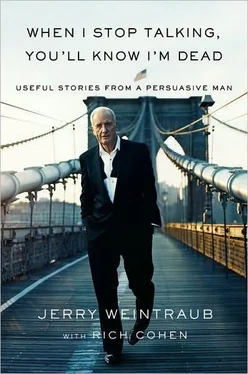A few days later I was at my desk, eating a pastrami sandwich and drinking a Dr. Brown's cream soda, when Avildsen barged in, shut the door, and locked it behind him.
"What's this?" I asked.
He put a videotape in the machine and said, "Just watch."
"Why?"
"It's only three minutes. Just watch!"
On came Pat Morita in costume as Miyagi, doing a monologue from the script. "Not bad," I said. "Really, not bad at all."
"Well?" asked Avildsen.
"All right," I said. "Call him up. We'll do a screen test."
We staged a test with Morita and Macchio, a scene in which the kid, who has been hurt, is in bed and Miyagi is nursing him. We shot it. And while we were shooting, I started to cry. I mean, real goddamn tears. The next day, as we were looking at the footage, I said to Avildsen, "You were right, so very right." Morita was nominated for an Academy Award for his performance in the movie.
No matter how hard you work on a movie, no matter how good you think it is, you never know how it's going to play. You have to wait for the first real audiences, an often endless purgatory of hoping and fearing. With The Karate Kid, the waiting ended in a moment of sheer joy. This was at a screening in LA a few weeks before the release. We hung around the lobby talking when the picture was over, then went to the parking lot. Most of the people had gone, but there were forty or fifty kids out there, with their arms outstretched and legs up, imitating the crane kick that comes at the climax of the movie. I knew right then that the picture was going to be a smash.
Armand Hammer had one of the most colorful biographies of the last century. His father, Julius, a Russian immigrant, headed the Communist Party in New York, which was unusual in that the family was quite prosperous. They owned a pharmaceutical company in the Bronx, but there was a scandal. I'm not sure of the details, but it had something to do with an illegal abortion and the death of a young woman. The family was horrified. Julius was sent to Sing Sing. If you're the son of a convict, the middle of three boys, it can have an effect.
Hammer graduated from Columbia medical school, but he never practiced. Still, he loved it when people called him "Dr. Hammer."
When he got out of school, the Russian revolution was in full bloom. There was a lot of suffering. Armand, who knew many of the Soviet leaders through his father-they visited the house on trips to America -decided something had to be done. He got hold of an old ship and filled it with medical supplies, which he took to the Soviets. I don't believe this was done as altruistically as Hammer claimed. I think he was actually unloading stuff his father could not sell. Nevertheless, Lenin heard about the shipments, this great act of charity, and asked to meet with "Dr. Hammer."
This was in the early 1920s, the Lenin of the black-and-white photos, peasant cap worn low, riding the crest of a terrifying wave. And here was Hammer, the son of the disgraced capitalist, shaking hands with Rasputin. Hammer used to say he was the only person who had been friends with both Lenin and Reagan; that was the scope of his life. Lenin thanked Hammer for all he had done, then asked if he wanted to help some more.
"Sure," said Hammer. "What do you need?"
"We have to do business in America," said Lenin. "We need to make deals with all your great men, Henry Ford, the bankers, the financiers. Why don't you represent us, take care of us?"
"Sure," said Hammer.
"And we want to pay you for the medical supplies," said Lenin. "But not in money."
He told Hammer to go to the Hermitage Museum and take whatever he wanted. Hammer went through the halls with a pointer, looking at masterpieces-he knew nothing about art-saying, "Give me two of those, and I'll take one of those, and that one of the monk in the red velvet robe, and that one of the dog." Rembrandts, Pissarros, Cezannes, Faberge eggs-he got them all. You can see his collection today at the Hammer Museum in LA. There is a curator and there are catalogues and shows and students writing dissertations, but this is how it started, with Hammer, trailed by a minder from the special police, going through the Hermitage, saying, "Give me one of that, give me two of that, give me three of that."
Armand Hammer made a fortune with the Soviets. For several years, he was the only conduit to the West, and thus had a piece of every industry.
The men around Lenin complained. Who is this American? It doesn't look right! He's getting too much. Lenin brought Hammer back to Moscow. He said, "Look, Armand, you can't have everything. Pick one business, one industry, and it will be yours."
"One industry?"
"Yes, one industry."
"Okay," said Hammer, "let me think about it."
And he went away, thought about it, and when he came back, he said, "Pencils."
"Pencils?" asked Lenin.
"Yes," said Hammer, "pencils. You've got millions and millions of people in this country, millions of them in school, and every one of them is going to need a pencil."
That was Hammer-head in the clouds, feet on the ground. He thought of basics, of important, everyday things.
Pencils? I mean, we're into big history here, Vladimir Ilyich Lenin, the man who overthrew the czars who defeated Napoleon who succeeded the Sun King and the rest, and what is Hammer thinking about? Pencils!
Hammer went to Germany, where he met with the executives of the Eberhard-Faber Company. He took a group of them back to Russia, where they set up a pencil factory. Hammer made every pencil in the Soviet Union.
By the time I met Hammer, which was decades later, he was on a first-name basis with the most powerful men in the world. He believed that personality could overcome anything, that a great man, by force of will, could straddle every divide-that's why he loved Lenin as much as he loved Reagan. Hammer was the CEO of Occidental Petroleum. This was typical of his luck and his life: The company was not meant to make money at all. He founded it as a tax shelter in the 1960s. Then, a foreman sank a tax shelter drill into an actual oil bed off California, and the old man was rich all over again. The first well came in when he was sixty-one. He was living in LA. Of course, I knew all about him. He was one of the grand old men of American business, and I was fascinated by him.
One day, I got a call from a movie executive who had taken a job with Hammer. He had decided to make movies, mostly about himself. The executive asked if I wanted to help produce a TV special about Dr. Hammer's upcoming cultural tour of the Soviet Union. For me it was less an opportunity to make a television show than a chance to meet and work with and learn from one of the great machers. No matter your age, you never stop looking for teachers. "No," I said, "I'm not interested in a one-time project with Armand Hammer, but I might consider an exclusive deal to cover all such cultural exchanges."
Five minutes later, the phone rang. It was Hammer. He said, "Hey, kid, get over here, let's talk."
I went to meet Hammer at his office in Beverly Hills. He was a small and steely man, with a helmet of silver hair and horn-rimmed glasses. There was mischief in his eyes. He said he wanted to be where the action was. He was always in jump position. In him, I saw big deals and fun. In me, he saw himself as a kid. We had the same sensibility, we rhymed. So we called our lawyer-we had the same lawyer-and told him to draft an agreement. Just like that, we were partners.
I loved to listen to him talk. My stories were about the Bronx, the Air Force, Elvis, the Colonel, Zeppelin, Sinatra. His were about the Communist Party, Trotsky, Lenin, Brezhnev, Moscow in January, Nixon, and Reagan. We hatched plans, crazy ideas.
I remember a trip we made to China. There must have been a reason for this trip, but in truth Hammer just liked to go for the sake of going. Airports, cities, languages-that was his thing. We spent the night on the plane, engines humming, the world black outside the window. Then Beijing came into view, a sea of lights. We were met on the tarmac by bands and diplomats. Armand was the main event wherever he happened to be. The Chinese had a manifest. It listed the dozens of people in our group. Because I was Armand's partner-in America we were Weintraub-Hammer, in the rest of the world we were Hammer-Weintraub-my name was second on the list, which, as far as the Chinese were concerned, made me something like a vice president.
Читать дальше

![Сьюзан Кейн - Quiet [The Power of Introverts in a World That Can't Stop Talking]](/books/33084/syuzan-kejn-quiet-the-power-of-introverts-in-a-wo-thumb.webp)










